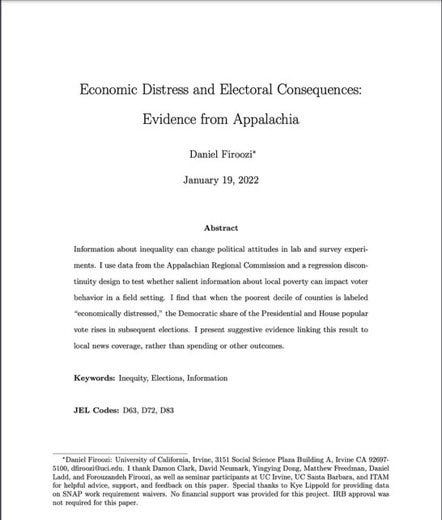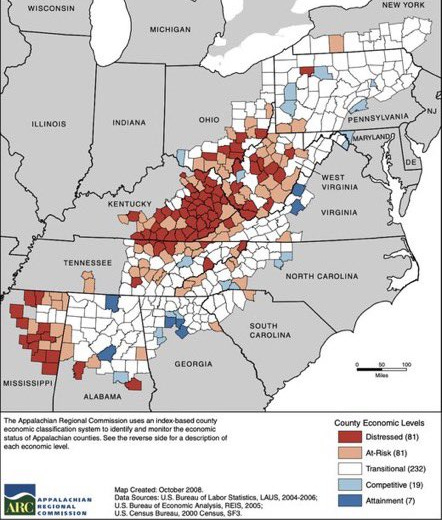Best of #econtwitter - Week of January 30, 2022 [1/3]
Jan 31, 2022
Welcome readers old and new to this week’s edition of Best of Econtwitter. Thanks to those sharing suggestions, over email or on Twitter @just_economics.
This is part one of three. Part two is here and part three is here.
Paper summary threads

Jessica Leight@leightjessica
Caught up on this recent NBER WP on labor productivity growth and industrialization in Africa by McMillan and @AlbertZeufack
nber.org/papers/w29570
Offers a very useful overview of trends in manufacturing and structural transformation in SSA; worth quick 🧵 #EconTwitter
nber.org
Labor Productivity Growth and Industrialization in Africa

5:38 PM · Jan 27, 2022
27 Reposts · 87 Likes

Sylvain Catherine@sc_cath
3⃣ The effects of these labels on the demand for apps are striking. Immediately after their release, downloads of data collecting apps dropped relative to their Android counterparts. These graphs show the share of iOS downloads in the total downloads of Android and iOS versions.

6:30 AM · Jan 28, 2022

Stefanie Stantcheva@S_Stantcheva
What are people's main concerns about taxes? In new paper w @bea_ferrario we provide answers and discuss new methods. We show how to design & analyze open-ended survey questions to elicit people's first-order concerns on issues. Thread ⬇️ scholar.harvard.edu/files/stantche… 1/N

3:13 PM · Jan 24, 2022
39 Reposts · 204 Likes

Daniel Firoozi@DanielFiroozi
In my new paper I show that Democratic candidates gained votes when Appalachia’s poorest counties were declared “economically distressed” based on local poverty, unemployment, and income. #EconTwitter


6:06 PM · Jan 24, 2022
69 Reposts · 223 Likes

Thomas Sampson@thom_sampson
Has Brexit hurt the UK's economy?
New paper with @swatdhingraLSE reviews the evidence ukandeu.ac.uk/working-paper/…
We conclude UK economy was around 2 to 3 percent smaller at end of 2019 because of Leave vote
Fall in GDP equates to loss of £650 to £1000 per person per year 1/

8:06 AM · Jan 25, 2022
288 Reposts · 474 Likes
Kids special pop-up section

Dr. Kimberly Noble@KimberlyGNoble
NEW FINDING: Cash support for low-income families changes their infants' brain activity. The first study from our #BabysFirstYears randomized control trial of poverty reduction is out, in @PNASNews. pnas.org/content/119/5/…
( 🧵)
pnas.org
The impact of a poverty reduction intervention on infant brain activity

8:20 PM · Jan 24, 2022
1.09K Reposts · 2.64K Likes

Dr. Kimberly Noble@KimberlyGNoble
The new paper reports the impact of the monthly cash support on infant brain activity after one year of the intervention. Infants of mothers in the high-cash gift group had more high-frequency (fast) brain activity compared with infants of mothers in the low-cash gift group.

8:20 PM · Jan 24, 2022
54 Reposts · 199 Likes
^results were covered in NYT and Vox Future Perfect and, relatedly, received a high level of (useful) scrutiny, e.g.:

Brendan Nyhan@BrendanNyhan
I really hope this is true but it's one paper, p=.02 with largest outcome added after preregistration, main result uses a post hoc combination of measures, and acknowledged sensitivity of results to differences between groups. Let's wait and see.

Jason DeParle @JasonDeParle
Striking research with relevance to the child tax credit debate: payments to poor mothers changed their babies' brains in ways that predict cognitive gains.https://t.co/LXGgdxKUed
9:14 PM · Jan 24, 2022
71 Reposts · 366 Likes

dylan matthews@dylanmatt
Useful critique of the PNAS baby EEG paper I wrote up on Monday
IMHO the results of this specific paper are much less interesting than the broader experiment, which will be gathering a lot more socially relevant data once kids are 3, 4, etc.
astralcodexten.substack.com
Against That Poverty And Infant EEGs Study

2:39 PM · Jan 26, 2022
25 Likes

Berk Özler@BerkOzler12
Today in Development Impact, I discuss the options when your pre-analysis plan specifies raw & covariate-adj. impacts, but they differ hugely: what should we infer? How should we think about the problem? How should media report findings from such papers?
blogs.worldbank.org/impactevaluati…

3:29 PM · Jan 31, 2022
1 Repost · 2 Likes
^a Stuart Ritchie thread that hits on similar points

Aaron Sojourner@aaronsojourner
@dylanmatt @StatModeling @slatestarcodex @StuartJRitchie Estimates on multiple outcomes all point towards benefit, tho most are imprecise.
Is it a slam dunk that ends the literature? No.
Is it categorically more credible than prior evidence & should it push priors towards theory that $ tends to benefit infant brain development? Yes.

9:19 PM · Jan 27, 2022
2 Reposts · 9 Likes
^Matt Darling offers a defense
In a separate study:

Samuel Hammond 🌐🏛@hamandcheese
Devastating new results on the effects of state-funded pre-K programs.
In policy you rarely get stronger study designs than random assignment + multi-year longitudinal follow-up.
Yikes.
doi.apa.org/doiLanding?doi…

8:29 PM · Jan 25, 2022
564 Reposts · 1.89K Likes

Derek Thompson@DKThomp
The evidence of state pre-K effectiveness has gotten worse over the last 50 years, leading to today's extremely discouraging study
pubmed.ncbi.nlm.nih.gov/35007113/
So, either pre-K is getting worse, or we're getting better at measuring how ineffective it is at raising achievement

11:01 PM · Jan 25, 2022
182 Reposts · 680 Likes
^John List suggests this is a scaling issue, and has a related book coming out

Noah Smith 🌐+🧦=🐇@Noahpinion
Evidence about pre-K shows:
1. Small, targeted programs are good
2. Academic benefits fade, social benefits last longer
3. Some programs are really bad
4. Big, scaled-up programs are pretty meh
5. Poor kids benefit more
6. Pre-K helps parents work
noahpinion.substack.com
Pre-K is day care

3:30 PM · Jan 31, 2022
3 Reposts · 31 Likes

